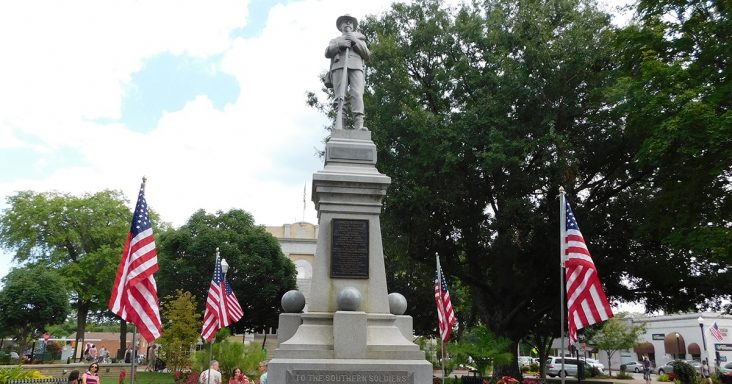Confederate statue removed from downtown square in Bentonville (UPDATED)
by September 2, 2020 9:31 am 3,187 views

Photo courtesy Jimmy Emerson via Flickr.
After 112 years, a statue of a Confederate soldier has been removed from Bentonville’s downtown square. Several onlookers gathered Wednesday morning (Sept. 2) as a construction crew started to disassemble the sculpture and its base.
The controversial statue was placed on the Bentonville square in 1908 and was mistakenly considered by some as a statue of former Arkansas Gov. James Berry, who took office in 1882. The statue is not of Berry, but is a common statue that is seen in many city squares and on courthouse lawns in the South. Berry helped pay for the statue, and a small plaque upon it in his honor following his death in 1913.
The statue and marker are scheduled to be relocated to a private park near the Bentonville Cemetery, according to an agreement announced in June between the Arkansas Division United Daughters of the Confederacy (UDC) and the Benton County Historical Society.
The private park and associated parking, according to a statement from Fort Smith attorney Joey McCutchen, who represents the UDC, will be named “James H. Berry Park.” Gov. Berry is buried in the Bentonville cemetery.
McCutchen said Wednesday a press event is scheduled next week at the site to unveil design plans for the park. He said the monument would be the centerpiece of the property, which will include a water feature and educational tables.
“It will satisfy the UDC’s goals of education, history and remembrance,” McCutchen said.
He said the construction of the park should begin in the next two months. In the meantime, the statue and marker will be stored at a private, undisclosed location. The Benton County Historical Society will own and operate the park and display the monument.
“We think this is a win-win for Benton County,” McCutchen said. “We think that things ought to be done this way. Where people are civil and have a dialogue.”
Jason Hendren, an attorney in Rogers with Wright Lindsey & Jennings, and public advocate for removing the statue from the Bentonville square, praised the removal as the right decision.
“The removal of the Confederate statue to a new location is the right decision, and shows that history is not ‘written in stone,’” he said in a statement provided to Talk Business & Politics. “As our community became more aware of the historical context of the statue, it grew to understand our shared history — and how to preserve and study it — in a more meaningful, inclusive and appropriate way.”
Benton County Judge Barry Moehring said he was at the downtown square at 5 a.m. Wednesday to help facilitate the statue’s removal. He said it inspired him to see the process unfold peacefully, considering Confederate statues and their meaning are a hot-button issue.
“There were a number of people on the square representing all kinds of political viewpoints,” he said. “They were peaceful, they were cordial and very polite to each other. I was heartened to see that.”
Moehring agreed with McCutchen’s “win-win” assessment. The statue will be preserved in a place of honor and the square will have a new beginning. He said the square is treated as a Bentonville city park and is maintained as such. He and Mayor Stephanie Orman have agreed the area where the monument stood will be landscaped over.
“There are no plans to replace the statue with anything at this point,” Moehring said. “It will be landscaped and the fountain around it will be maintained. At some point in the future could something be put there? Who knows. But there is no plan and timetable for that.”
Confederate statues around the country are being destroyed, vandalized or taken down amid a national reckoning over race and police brutality sparked by the killing of George Floyd in Minneapolis on May 25.
Sebastian County and Fort Smith officials are discussing the future of a Confederate statue on the grounds of the Sebastian County courthouse.
The Fort Smith School Board also voted recently to rename Albert Pike Elementary School and the city is exploring the idea of renaming Albert Pike Avenue.
Pike settled in Fort Smith in 1833 and taught school while he studied law. He opened a law practice in 1834. He later served as a general in the Confederate Army. Pike joined a petition in 1858 to “expel all free blacks from the State of Arkansas” and wrote in 1868, “We mean that the white race, and that race alone, shall govern this country. It is the only one that is fit to govern, and it is the only one that shall.”
